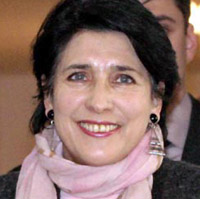Georgian ex minister of foreign affairs Salome Zurabishvili, who has been involved in opposition since he left his position, made the first public meeting with his followers on Saturday. Several hundreds of people led by Salome Zurashvili walked on the streets of Tbilisi up to the building of parliament, where the ex minister put flowers at the monuments of Georgian famous writers Ilia Chavchavadze and Akaki Tseretelli. Thus Salome Zurabishvili expressed his complaints as he went against the awful legislation changes, which had been already worked out by the parliamentary commission on juridical issues. “This is a jump to the “scary” period of Bolshevism. Neo-bolshevism is coming”, -said Zurabishvili.
The legislation changes are really bad. The problem is that police and other authorized bodies can institute legal proceedings even only on the basis of an unknown call, they can kill a criminal if he doesn’t obey when being arrested, as well as they prohibit Mass Media representatives be present at court proceedings and cases: they can broadcast court proceedings only after getting a relevant permission.
The first amendment is so poor that it is not worthy even to discuss it.
It is chaos in Georgia since police officers killed a 19 year old boy that was suspected to be a thief. They just shot him as soon as he made an attempt to run away from the scene of the crime. Due to the EU efforts, sentence of death is prohibited in Georgia. But instead of this police officers can kill people, thus realizing their own “sentence of death”. Even more, the members of their parliament agree to give a force to this kind of law. Saakashvili also agrees with them. Recently Saakashvili, during his visit to Kutaisi, said jokingly that criminals didn’t have any reason to be happy because they had created good conditions for them in prisons, because those who tried to run away would be killed at the site. Later it turned out that it wasn’t a joke.
The third amendment that abuses the presence of Mass Media representatives during court proceedings in fact creates very good chances not to conduct these proceedings in fair and open conditions. Until the court considers the application of Mass Media representatives to let them broadcast the proceedings, the information will get old and there will be no need for that any more. In a word this situation doesn’t seem to be optimistic.
It is said that one of the main participants in those changes said that he didn’t care about the legislation and his only aim was to stay in his position as long as he could and that he would do everything to reach his goal. And lawyers have already started to complaint and try to gain the attention of the society and Western institutions. But as the experience of post-revolutionary Georgia witnesses, it is not difficult for the parliamentary majority to adopt any law, because the opposition is really minority and whatever they do they can’t influence the final results.

